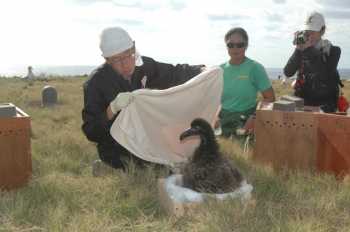Mukojima Island in the Japanese Ogasawara (Bonin) Islands supports breeding colonies of genetically distinct Black-footed Phoebastria nigripes and of Laysan P. immutabilis Albatrosses. It is also the site of ongoing attempts to establish a new colony (on a non-actively volcanic island) of Short-tailed Albatrosses P. albatrus by translocating chicks from Torishima (click here for an earlier ACAP news item).
During January to March this year Dr Takuma Hashimoto of the Japan Wildlife Research Center, Tokyo led a team that dropped the rodenticide diphacinone on the 256-ha island in an attempt to rid it of Black or Ship Rats Rattus rattus. Although it is still too early to be definite, the chances of their eradication appear good.

The Ogasawara Islands, including Mukojima, are due to be considered for World Heritage status in 2011. Click here for the World Heritage nomination text. The Ogasawara Islands Ecosystem Conservation Action Plan is available at http://ogasawara-info.jp/pdf/isan/ActionPlan_eigo.pdf.
References:
Harrison, C. 2009 [=2010]. Rat eradication in Ogasawara Islands. In: Conservation Report, Summer 2010. Pacific Seabirds 36(2): 48. http://www.pacificseabirdgroup.org/publications/PacificSeabirds/VOL_36_2.pdf.
Hashimoto, T. 2010. Eradication and ecosystem impacts of rats in the Ogasawara Islands. In: Kawakami, K & Okochi, I. (Eds). Restoring the Oceanic Island Ecosystem. Impact and Management of Invasive Alien Species in the Bonin Islands. Tokyo: Springer. pp. 153-159. http://www.springerlink.com/content/k74772406nrj848v/.
With thanks to Crag Harrison, Mike Rauzon and Tatsuo Yabe for information.
John Cooper, ACAP Information Officer, 12 November 2010

 English
English  Français
Français  Español
Español